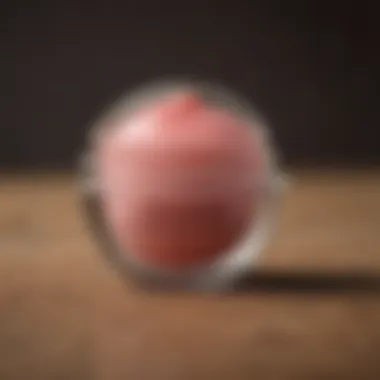Effective Home Remedies for Cracked Lips


Intro
Cracked lips at the corners, clinically referred to as angular cheilitis, can appear trivial yet they often bring a great deal of discomfort. Those affected may notice dryness, inflammation, and even fissures that not only appear unsightly but may also result in pain during various activities, such as talking or eating. While medical intervention may provide relief in severe cases, many individuals prefer to explore home remedies as an effective means to alleviate this condition. This article aims to explore the intersections of hydration, nutrition, and accessible home remedies to combat this issue.
Understanding the root causes of cracked lips is essential. Factors such as climate, dehydration, and nutritional deficiencies often contribute to this frustrating ailment. The solutions offered within these pages are designed to empower readers, providing practical advice that is both straightforward and effective.
Wellness Insights
The Role of Hydration
Proper hydration plays a pivotal role in maintaining skin health, including that of the lips. When the body is not adequately hydrated, the skin tends to become dry and prone to cracking. Adults should aim to drink at least 8 cups of water daily, more so in hot and dry climates. Herbal teas or infused waters can also contribute to daily intake.
"Adequate hydration is not just a beauty mantra; it is pivotal for optimal health."
The Importance of Lip Protection
Similar to how we apply sunscreen to shield our skin, protecting the lips is equally important. Environmental stressors, such as wind and sun exposure, can accelerate the cracking process. Using lip balms that contain natural oils, like coconut or shea butter, can help create a barrier and maintain moisture.
Nutrition Information
Balanced Diet Essentials
A nutritious diet directly correlates with skin health. Incorporating foods rich in vitamins B and E, zinc, and omega-3 fatty acids can enhance skin resilience. Here are some beneficial foods:
- Avocados: Rich in fats and vitamins.
- Nuts: Provide essential fatty acids.
- Leafy Greens: High in vitamins and minerals.
- Fish: Offers omega-3 for skin hydration.
Supplementing for Skin Health
For those struggling to maintain a balanced diet, supplements such as fish oil or vitamin B complex may be considered after consulting a healthcare provider. These can support skin vitality and improve overall hydration.
By combining hydration strategies with nutritional awareness, individuals can take significant steps toward alleviating cracked lips at the corners. The practical remedies to be discussed next will further assist readers in achieving smoother and healthier lips.
Understanding Cracked Lips
Cracked lips, especially at the corners, can significantly affect one's comfort and self-esteem. They often signal an underlying issue that requires attention, whether it be environmental factors, inadequate hydration, or nutritional deficiencies. Understanding the reasons behind cracked lips can help create effective remedies. This knowledge empowers readers to take proactive steps towards maintaining lip health while improving their overall well-being. In this article, we will explore the anatomy of the lips and uncover common causes of cracks, providing a foundation to handle this issue effectively.
Anatomy of the Lips
The lips consist of delicate skin that is thinner than most other areas of the body. The outer layer, or epidermis, is particularly sensitive. Beneath this is a rich network of blood vessels which give lips their color and warmth. The lips also lack oil glands, making them more susceptible to dryness and cracking. Understanding this anatomy highlights the need for protection and hydration, as the lips do not retain moisture well on their own. This knowledge is crucial for those looking to implement effective remedies for cracked lips.
Common Causes of Cracks
Dehydration
Dehydration is one of the primary contributors to cracked lips. When the body is not sufficiently hydrated, it affects the moisture balance of the skin, including that of the lips. The key characteristic of dehydration is the lack of water in the body, which can result from insufficient fluid intake or excessive loss through sweat and urination. This condition makes it increasingly vital to focus on proper hydration as a remedy.
Unique Feature: While many focus only on using lip balms, addressing the root cause through increased hydration offers a longer-lasting solution to lip cracks. Drinking adequate amounts of water daily can significantly improve lip health.
Weather Conditions
Weather conditions can have a profound impact on lip integrity. Windy or cold environments can strip moisture from the lips, leading to cracks. Additionally, excessive sun exposure can cause sunburned and dried-out lips. The key characteristic of weather conditions is their variability; thus, lip care must adapt accordingly.
Unique Feature: Understanding how to adjust lip care practices based on environmental changes can prevent future issues. Using protective lip balms that contain SPF during sunny days or avoiding exposure to excessive winds can serve as beneficial strategies.


Nutritional Deficiencies
Nutritional deficiencies often go unnoticed but play a significant role in lip health. A lack of key vitamins and minerals can lead to dry, cracked lips. For example, deficiencies in B vitamins or zinc can manifest as lip cracking. The key characteristic here is that a well-rounded diet directly contributes to skin health, including that of the lips.
Unique Feature: Focusing on diet can be instrumental in preventing and treating cracked lips. Incorporating foods rich in these nutrients can serve dual purposes, enhancing both overall health and the condition of the lips.
Medical Conditions
Some medical conditions can lead to persistent issues with cracked lips. Conditions such as eczema, psoriasis, or infections can create inflammation and dryness around the lip area. The key characteristic of these medical issues is their need for specific treatments and attention.
Unique Feature: Recognizing that cracked lips can sometimes be a symptom of a more serious underlying health condition is important. In such cases, consulting a healthcare professional for proper diagnosis and treatment becomes essential.
Role of Hydration in Lip Health
Hydration plays a crucial role in maintaining the health of lips. The lips are delicate and lack oil glands, making them susceptible to dryness and cracking. Proper hydration ensures that the skin remains supple and less prone to damage. With adequate hydration, skin cells function optimally, which is essential for healing and overall appearance of the lips. Notably, hydration comes from both internal and external sources, and understanding this balance is key for lip care.
Importance of Water Intake
Water intake significantly affects how well the body, including the lips, stays hydrated. When the body is dehydrated, it reflects in the skin and can lead to noticeable issues such as chapped lips. Regular intake of water facilitates the transport of nutrients within the body, contributing to overall skin health. It's essential to consume enough water daily—generally, it is recommended to drink eight 8-ounce glasses, though individual needs may vary.
Moisturizing Techniques
Moisturizing is a fundamental aspect of lip care that supports hydration. Two primary methods can help maintain moisture in the lips: the use of lip balms and natural oils.
Use of Lip Balms
Lip balms are designed to offer immediate relief for dry lips. They often contain occlusive agents which form a barrier, locking in moisture and preventing water loss. A key characteristic of lip balms is their ability to create a protective layer on the lips, which can be particularly beneficial during cold weather or low humidity.
These products are readily available and often enriched with beneficial ingredients. Some balms may contain soothing compounds, making them a popular choice for those seeking relief from discomfort. However, not all lip balms are created equal. It's important to choose products that do not contain harmful ingredients like artificial fragrances or certain preservatives, as these can further irritate sensitive lips.
Natural Oils
Natural oils such as coconut oil and almond oil have gained attention for their moisturizing properties. Unlike traditional lip balms, which may contain synthetic substances, natural oils are often free from harsh chemicals, making them a gentler option for many users. They penetrate the skin, providing deeper hydration.
The unique feature of natural oils lies in their nutritional content. Oils like those from coconut and almond are rich in fatty acids and vitamins, which nourish and hydrate the lips effectively. Many people prefer these oils due to their natural origin, which aligns well with holistic wellness principles. However, it's vital to ensure that the oil used is of high quality to maximize its benefits.
Key Point: Ensuring proper hydration is fundamental to maintaining healthy lips. This includes maintaining personal hydration habits, using effective moisturizing techniques, and selecting the right products for your lips.
Nutritional Factors Affecting Lip Health
Nutritional factors play an essential role in the health of your lips. Good nutrition ensures that your body gets the vital nutrients it needs to maintain skin elasticity and moisture. Lips, being particularly thin and sensitive, require specific vitamins and minerals to stay healthy. Insufficient intake of these nutrients can lead to cracked lips, therefore making their understanding crucial for prevention and treatment.
Key Vitamins and Minerals
Vitamin B Complex
Vitamin B complex comprises several essential B vitamins that support overall skin health. It aids in maintaining skin hydration and integrity, which is crucial for preventing cracks in the lips. One key characteristic of B vitamins is their role in managing stress levels, which can also affect lip condition. This makes Vitamin B complex particularly beneficial for individuals experiencing stress-related lip issues. However, an important consideration is to consume these vitamins in balanced amounts. Excessive supplementation can lead to issues, so it’s advisable to consult with a healthcare provider before starting any supplementation.
Vitamin E
Vitamin E is known for its antioxidant properties. It contributes to skin health by protecting cells from damage caused by free radicals. This vitamin is beneficial for cracked lips because it promotes healing and provides moisture. Besides its key characteristic of being a powerful antioxidant, Vitamin E's unique feature lies in its capacity to improve blood circulation to the skin, thereby enhancing repair processes. While it is widely regarded as helpful, be mindful of potential skin reactions. Some individuals may experience sensitivity to topical applications.
Zinc


Zinc plays a critical role in maintaining skin barrier function and plays a vital part in healing processes. One key characteristic of Zinc is its anti-inflammatory properties, which can reduce irritation in cracked lips. Its effectiveness in promoting skin repair makes it a beneficial mineral for this issue. Zinc’s unique feature is its ability to enhance cell turnover. However, there is a risk of taking too much zinc, leading to toxicity. Therefore, ensuring optimal intake through diet is advisable, rather than relying heavily on supplements.
Dietary Recommendations
Incorporating Fruits and Vegetables
Fruits and vegetables are rich sources of vitamins, minerals, and antioxidants. Including them in your diet contributes significantly to lip health. They provide hydration and essential nutrients needed to maintain skin moisture and elasticity. Their key characteristic is their natural ability to hydrate from within, which is crucial for preventing cracks. Furthermore, their unique feature is the fiber content, which benefits overall health. However, timing and preparation matter; consuming whole fruits and uncooked vegetables maximizes nutrient intake.
Avoiding Dehydrating Foods
Avoiding dehydrating foods is equally vital. Certain food items, like salty snacks and caffeine, can lead to moisture loss, making lips more prone to cracks. Their key characteristic is their diuretic effect, which increases the loss of body fluids. Avoid these foods can significantly contribute to lip health. Unique features include their impact on overall hydration levels in the body. On the other hand, it’s not always practical to eliminate these items completely, so moderation should be considered a beneficial approach.
"Nutrition plays a vital role in the health and appearance of your lips. Understanding what to eat and what to avoid can help maintain hydration and prevent cracking."
By focusing on both incorporating beneficial nutrients and avoiding detrimental ones, individuals can greatly improve their lip health.
Effective Home Remedies for Cracked Lips
Cracked lips, especially at the corners, can be both uncomfortable and unsightly. Finding effective home remedies is crucial for restoring lip health and comfort. Home remedies provide an accessible and practical approach to this common issue, often using ingredients readily found at home. They are affordable alternatives to over-the-counter products that may contain harmful additives. This section explores various home remedies that can help alleviate symptoms and promote healing, emphasizing their role in everyday lip care.
Natural Moisturizers
Coconut Oil
Coconut oil is a prominent natural moisturizer that effectively combats cracked lips. Its key characteristic lies in its rich fatty acid content, particularly lauric acid, which has antimicrobial properties. This oil penetrates easy into the skin, providing deep moisture and creating a barrier against moisture loss. Its unique feature is its ability to soothe irritation and reduce the appearance of cracks. However, some individuals may find coconut oil to be too oily for their liking, which might deter its consistent use.
Almond Oil
Almond oil is another highly beneficial option for lip care. Composed of vitamin E and essential fatty acids, it nourishes and hydrates the skin. Almond oil not just softens, but also helps in preventing further cracking. It is a popular choice because it absorbs quickly and does not leave a greasy residue. A disadvantage might be its high cost compared to other oils, which may make it less accessible for some. Yet, its effectiveness can justify the expense for many users.
Shea Butter
Shea butter is a well-known remedy celebrated for its deep moisturizing qualities. It contains vitamins A and E, alongside essential fatty acids that restore lip health. Its key advantage is its thick consistency, making it excellent for locking in moisture. Additionally, it provides a protective barrier that shields lips from environmental aggressors. On the downside, some people may find shea butter too heavy for everyday use, especially in warmer climates.
Exfoliating Treatments
Homemade Sugar Scrubs
Homemade sugar scrubs are an effective exfoliation treatment for cracked lips. By using a simple combination of sugar and oil, these scrubs remove dead skin cells, promoting smoother lips. The gentle exfoliation helps to prevent the build-up of dry skin, which can exacerbate cracking. They are beneficial due to their customizable nature; individuals can add various oils or honey to suit their preferences. However, over-exfoliating can lead to irritation, so moderation is key.
Soft Cloth Method
The soft cloth method involves using a damp, soft cloth to gently exfoliate lips. This technique is straightforward and does not require any additional ingredients. By regularly rubbing the cloth on the lips, dead skin cells are removed, which can help the lips appear healthier. Its simplicity makes it a beneficial choice for many. However, this method may not provide as thorough exfoliation as sugar scrubs, potentially requiring more frequent use.
Healing Paste Solutions
Beeswax and Honey Combination
The combination of beeswax and honey is not only a traditional remedy but also effective for healing cracked lips. Beeswax offers a protective layer, while honey is known for its natural healing properties. This mixture helps to maintain moisture and promotes faster healing of fissures. A key characteristic of this method is its natural composition, making it appealing for those seeking holistic options. However, some may have allergies to beeswax or honey, which could limit its use.
Over-the-Counter Remedies
Over-the-counter remedies, while not strictly home-based, can complement the natural approaches discussed. Products like medicated lip balms often contain ingredients like petrolatum that seal in moisture and protect against environmental damage. Their convenience makes them a practical choice for busy individuals. However, some over-the-counter options may contain artificial fragrances or additives that can irritate sensitive skin. It is essential to read labels and choose products that align with personal health needs.


"Effective home remedies not only provide relief but also encourage a proactive approach to lip care."
By utilizing these remedies, individuals can achieve healthier lips and reduce the risk of future cracking. The combination of natural moisturizers, exfoliation treatments, and healing solutions presents a comprehensive approach to maintaining lip health.
Preventive Measures for Lip Care
Preventive measures are crucial in maintaining the health and appearance of the lips. Cracked lips are not only uncomfortable but can signal underlying issues. Addressing these concerns early can prevent further complications. By adopting an effective lip care routine, it is possible to preserve moisture in the lips and avoid damage from external factors. This section discusses steps to consider.
Choosing the Right Lip Products
Avoiding Harmful Ingredients
When selecting lip products, it is vital to avoid harmful ingredients. Products featuring synthetic fragrances, harsh preservatives, and parabens can exacerbate dryness and irritation. Often, these components can strip the natural oils of the lips, leading to more serious conditions. Instead, look for products that prioritize natural ingredients, which generally provide better hydration without causing adverse effects. Choosing options free of these harmful chemicals can significantly enhance overall lip health, making this a valuable approach for those seeking healthier lips in the long run.
Opting for SPF Protection
It is often overlooked that lips require sun protection too. Opting for lip products with SPF can safeguard these delicate tissues against harmful UV rays. The primary characteristic of these products is their ability to shield against sun exposure, highly beneficial during outdoor activities. A unique feature is that many lip balms now fuse hydrating elements with SPF. This dual function not only aids in preventing dryness but also guards against sun damage, a significant contributor to lip issues. Practicing sun protection thorough choosing SPF lip products can thus play a crucial role in maintaining lip integrity.
Maintaining Optimal Lip Care Routine
Daily Moisturization
Daily moisturization should be a fundamental part of any lip care regimen. Consistent application of lip balms or natural oils can ensure that lips remain hydrated throughout the day. The underlying characteristic of this practice is its preventive nature. By creating a protective barrier, these products lock in moisture and fend off environmental factors like wind and cold air. It is wise to incorporate moisturizing steps into morning and evening routines, as this helps to continually reinforce lip hydration and protect against cracks.
Regular Hydration Awareness
Regular hydration awareness also plays a crucial role in lip care. Understanding one’s fluid intake and ensuring adequate hydration can directly influence lip moisture levels. Often, cracked lips correlate with overall dehydration. Keeping track of water intake and recognizing cues of thirst can be effective in preventing dryness. This system promotes better hydration habits, which benefit not only lip health but the body as a whole. Awareness in hydration practices can therefore enhance lip vitality and choosiness when it comes to external care.
When to Seek Professional Help
Understanding when to seek professional help is fundamental when dealing with cracked lips at the corners. While many home remedies might alleviate the issue, persistent or severe cracking often indicates underlying problems. These may include infections, allergic reactions, or systemic health conditions. Knowing the right time to consult a healthcare professional can prevent further complications and ensure that the most effective treatments are applied.
Signs of Severe Cracking
It is essential to recognize the signs that require immediate medical attention. Severe cracking may involve:
- Excessive pain: If lips are painful to the touch, this can indicate a more serious issue.
- Bleeding: Visible bleeding is a strong indicator of damage that needs professional evaluation.
- Infection signs: Symptoms like swelling, redness, and pus suggest an infection.
- Persistent symptoms: If the condition does not improve despite using home remedies for several days, it may be time to consult a professional.
Identifying these signs early can help in obtaining the correct diagnosis and treatment, which is crucial for overall lip health.
Consultation with a Dermatologist
Consulting a dermatologist can significantly impact one's journey toward better lip health. Dermatologists specialize in skin conditions, including issues affecting the lips. They can provide a structured approach to diagnose and treat the underlying causes of cracked lips.
Diagnostic Approaches
The diagnostic approaches adopted by dermatologists underscore their expertise. Key characteristics of these approaches include:
- Comprehensive assessment: A thorough examination of the lips and an assessment of medical history often provides valuable insights.
- Allergy testing: This can help identify if allergens are contributing to the cracking.
- Biopsy: In some cases, a small skin sample may be taken to rule out more serious conditions.
These methods are beneficial because they allow for a tailored treatment plan. The unique feature of diagnostic approaches is their focus on pinpointing the exact cause of the problem, enabling targeted treatment.
Potential Medical Treatments
After evaluation, dermatologists may recommend several medical treatments tailored to the individual’s needs. The notable aspects of potential medical treatments include:
- Prescription ointments: These may contain stronger active ingredients to help heal and protect the lip area.
- Oral supplements: If nutritional deficiencies are identified, supplements may be suggested.
- Allergy medications: Antihistamines and similar pharmaceuticals can alleviate symptoms tied to allergies.
These options present a powerful advantage in combating severe or chronic lip issues. However, potential disadvantages may include side effects from medicated ointments or the need for regular follow-ups.
To conclude, understanding when to seek professional help and what signs to look for is critical for effective treatment of cracked lips. Consulting a dermatologist can yield a personalized approach that enhances skin health and addresses underlying conditions.



